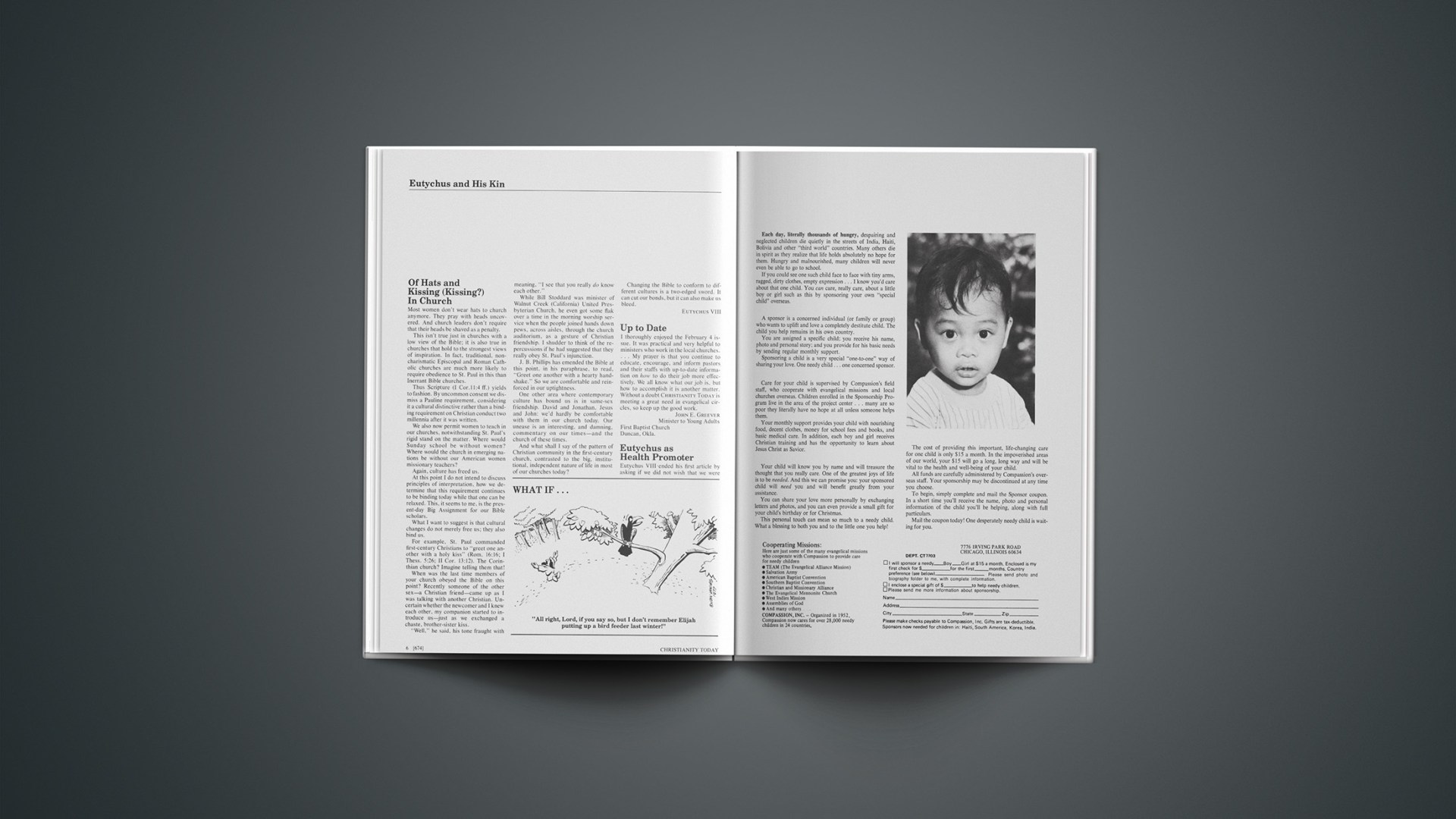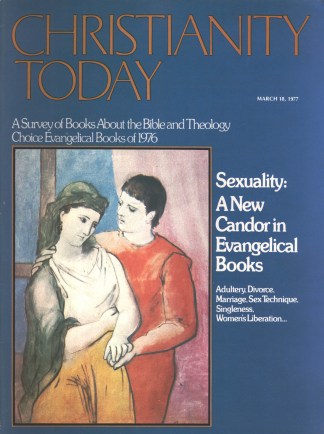Of Hats and Kissing (Kissing?) In Church
Most women don’t wear hats to church anymore. They pray with heads uncovered. And church leaders don’t require that their heads be shaved as a penalty.
This isn’t true just in churches with a low view of the Bible; it is also true in churches that hold to the strongest views of inspiration. In fact, traditional, non-charismatic Episcopal and Roman Catholic churches are much more likely to require obedience to St. Paul in this than Inerrant Bible churches.
Thus Scripture (1 Cor. 11:4 ff.) yields to fashion. By uncommon consent we dismiss a Pauline requirement, considering it a cultural distinctive rather than a binding requirement on Christian conduct two millennia after it was written.
We also now permit women to teach in our churches, notwithstanding St. Paul’s rigid stand on the matter. Where would Sunday school be without women? Where would the church in emerging nations be without our American women missionary teachers?
Again, culture has freed us.
At this point I do not intend to discuss principles of interpretation, how we determine that this requirement continues to be binding today while that one can be relaxed. This, it seems to me, is the present-day Big Assignment for our Bible scholars.
What I want to suggest is that cultural changes do not merely free us; they also bind us.
For example, St. Paul commanded first-century Christians to “greet one another with a holy kiss” (Rom. 16:16; 1 Thess. 5:26; 2 Cor. 13:12). The Corinthian church? Imagine telling them that!
When was the last time members of your church obeyed the Bible on this point? Recently someone of the other sex—a Christian friend—came up as I was talking with another Christian. Uncertain whether the newcomer and I knew each other, my companion started to introduce us—just as we exchanged a chaste, brother-sister kiss.
“Well,” he said, his tone fraught with meaning, “I see that you really do know each other.”
While Bill Stoddard was minister of Walnut Creek (California) United Presbyterian Church, he even got some flak over a time in the morning worship service when the people joined hands down pews, across aisles, through the church auditorium, as a gesture of Christian friendship. I shudder to think of the repercussions if he had suggested that they really obey St. Paul’s injunction.
J. B. Phillips has emended the Bible at this point, in his paraphrase, to read, “Greet one another with a hearty handshake.” So we are comfortable and reinforced in our uptightness.
One other area where contemporary culture has bound us is in same-sex friendship. David and Jonathan, Jesus and John: we’d hardly be comfortable with them in our church today. Our unease is an interesting, and damning, commentary on our times—and the church of these times.
And what shall I say of the pattern of Christian community in the first-century church, contrasted to the big, institutional, independent nature of life in most of our churches today?
Changing the Bible to conform to different cultures is a two-edged sword. It can cut our bonds, but it can also make us bleed.
EUTYCHUS VIII
Up to Date
I thoroughly enjoyed the February 4 issue. It was practical and very helpful to ministers who work in the local churches.… My prayer is that you continue to educate, encourage, and inform pastors and their staffs with up-to-date information on how to do their job more effectively. We all know what our job is, but how to accomplish it is another matter. Without a doubt Christianity Today is meeting a great need in evangelical circles, so keep up the good work.
JOHN E. GREEVER
Minister to Young Adults
First Baptist Church
Duncan, Okla.
Eutychus as Health Promoter
Eutychus VIII ended his first article by asking if we did not wish that we were Eutychus VIII. Well, now that we have just read his second article (Jan. 21) we do wish we were—well, almost! Yes, E. VIII, give us “more of the same”! We like your style, and we promise not to become the least bit envious of your newly found honor.
“Being cheerful keeps you healthy. It is slow death to be gloomy all the time.” That is the way the Good News Bible says it in Proverbs 17:22.
A. RALPH BOXELL
Church of the Nazarene
Deepwater, Mo.
A Dying Fire?
The “interpretations” by Bill Bristow of Andrew Wyeth’s art (Refiner’s Fire, Feb. 4) would have been disgusting had they not been so ludicrous. Surely this is not a Christian approach to the fine arts. The same thing would not have been tolerated if Tolkien’s trilogy had been the subject, though Tolkien was a professed Christian, while Wyeth is not. Let’s turn the fire up a bit.
THOM N. SMITH
Sand Springs, Okla.
Bill Bristow’s evaluation of Andrew Wyeth was a welcome event. CHRISTIANITY TODAY too often ignores visual art in favor of the various forms of literature. But Bristow’s strained effort to translate Wyeth into an “oracle pronouncing God’s love for us”—which he isn’t—seemed much too subjective and not a little contrived. Because Wyeth’s paintings are not pictorially bewildering, the temptation to imbue his work with our own reminiscences and anecdotes of country life is ever present. We feel secure in his artistic realism. But the artist’s message is too ambiguous to be so confidently labeled.
I fail to see “the promise of new life, of resurrection” in Wyeth’s portrait of the Kuerners (his Pennsylvania subjects) in which Karl points the barrel of his rifle—accidentally?—at his wife, Anna. Where is the charm in the hungry, black meat hooks that proliferate in his work? Rather than the “pursuit of humankind by God” that Bristow visualizes, I see in Wyeth, as John Russell of the New York Times so aptly described it, an “element of doom.”
MARK MARCHAK
New York, N.Y.
The first half of the article I thought lent something to my understanding of the character and the person of Andrew Wyeth, one of our more gifted contemporary painters. I felt that Bristow’s description of the almost mystical entrance of Wyeth’s personality into the subjects of his paintings was a fine treatment. However, his mystical interpretation of two of Wyeth’s paintings, “Winter 1946” and “Christina’s World,” is a distortion of Wyeth’s intent in both instances.
If one is writing an article for your magazine utilizing certain passages of Scripture, one is expected to deal with the text objectively and exegetically. There is no reason why a similarly objective treatment of this very significant painter should not be included in your magazine. Eisegesis is as inappropriate in this kind of art criticism as it is with Scripture. I appreciate your attempt to deal with a painter like Wyeth, but it is no good to load his work with a symbolism that is not there. What are Wyeth’s religious roots, his convictions, that encourage his reverence for the homely, the commonplace, the natural?
JUDSON GUEST
Aurora College
Aurora, Ill. Assistant Dean of Students
No Sizzle, No Sale
“The Perils of Persuasive Preaching” (Feb. 4) was a pulchritude of pernicious propaganda.… Dr. Litfin has reacted to persuasion for unethical goals by denouncing persuasion as an ethical tool. His lack of adequate research left his article replete with half-truths. Hypnotism, suggestion, and persuasion have no mystic ability to bypass the human will. It is impossible to motivate anyone without first convincing them intellectually.… Not even the Manchurian Candidate can sell a steak without the sizzle. Let’s just be sure it isn’t polluted meat that has been offered to idols.
DESSAIN TERRY
Lanark Church of Christ
San Antonio, Tex.
A. Duane Litfin’s article clarifies some long-foggy areas in my own mind and I suspect in the minds of many churchmen.
RON KLIMP
Grand Rapids, Mich.
A hearty “amen” to Dr. Litfin’s analysis. His balanced and fair critique of this trend mirrors the thrust of the New Testament. Paul, in writing to his spiritual son, instructed him to handle accurately the word of truth. Today, if a pastor does not entertain and wax eloquent even though he handles accurately and communicates clearly the Scripture, he is a leading candidate for the unemployment line. However, the burden of proof rests upon those of us who listen to God’s word rightly divided and communicated, not on the preacher who did not rouse us from our coffins through catchy phrases and sensational illustrations. For indeed, the listener of God’s Word has to open the coffin from the inside.
BARRY A. LAWRENCE
Associate Pastor
Tulsa Bible Church
Tulsa, Okla.










